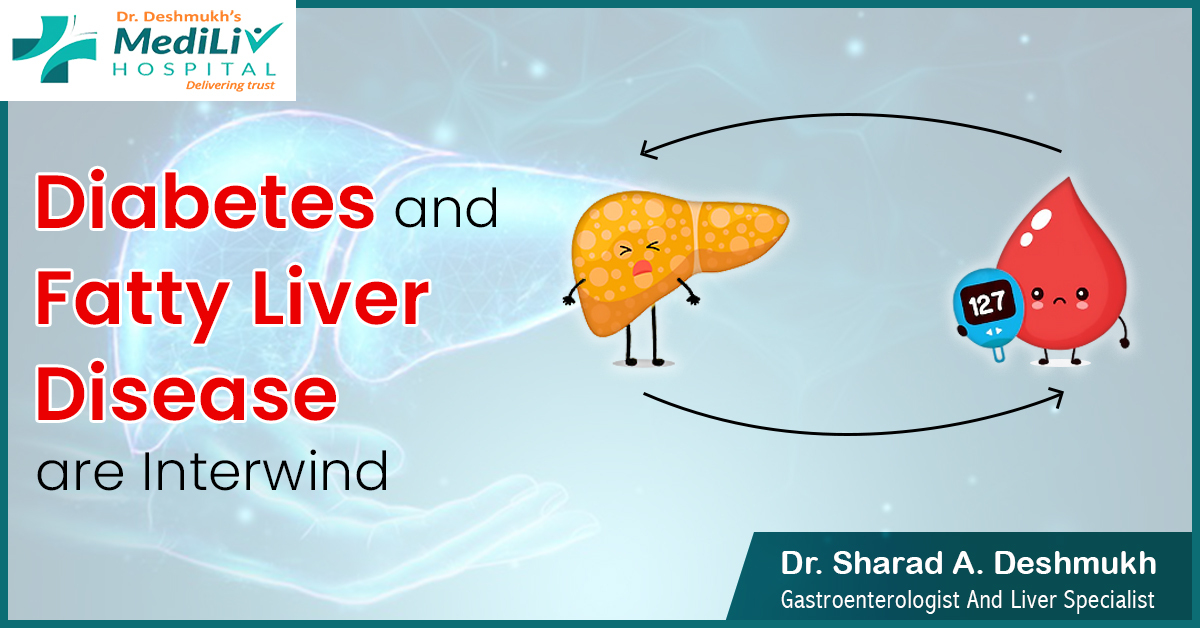Do you have diabetes? Give your liver extra attention. Non-alcoholic fatty liver disease (NAFLD) is a group of liver diseases that can affect people even if they drink very little or no alcohol. Diabetes is a significant risk factor for NAFLD.
The accumulation of fat in the liver due to NAFLD produces swelling, inflammation, and even scarring at various levels. If the disease is not treated, it could lead to liver cirrhosis and a liver transplant would be recommended. Most significantly, fatty liver disease affects nearly 50% of type 2 diabetes cases.
Symptoms of Fatty Liver Disease
A fatty liver does not manifest any symptoms. There is a possibility that you will experience fatigue or slight abdominal pain on the upper right side.
If untreated, fatty liver may develop into scarring or fibrosis of the liver. Cirrhosis is caused by severe liver fibrosis. Loss of appetite, weakness, weakness, weight loss, nasal bleeds, yellowing of the skin and eyes, stomach pain and swelling, swelling of the legs, confusion, and itchy skin are all signs of liver cirrhosis.
Causes of Fatty Liver Disease
The fatty liver disease develops due to the production of excessive fat in your body or decreased efficiency in the metabolization of fats. Fatty liver disease is spurred on by the extra fat that accumulates in your body’s liver cells.
Your body produces excessively fat or breaks down lipids less effectively, which leads to the development of the fatty liver disease.
The prevalence of fatty liver is significantly influenced by the following factors:
- Obesity
- High blood sugar
- Blood cholesterol and triglyceride levels that are level than normal Insulin resistance
- A few genes, as well as different illnesses like hepatitis C,
Fatty Liver Disease & Diabetes
Fatty liver disease has other causes except diabetes. However, you will probably also get fatty liver disease if you have diabetes. Due to their obesity and insulin resistance, the two diseases often co-occur in some patients. Therefore, it is imperative to maintain control over your blood sugar levels if you have diabetes or are prediabetic. This will keep your general health intact and help avoid the repercussions of fatty liver disease.
Treatment of Fatty Liver Disease
The condition known as fatty liver disease cannot be treated with medication. Dietary and lifestyle modifications can aid in the condition’s cure.
Take these additional steps to minimize your risk of developing fatty liver disease.
- Limit Or Avoid Alcohol Completely
Alcohol consumption is directly associated with higher levels of cholesterol and blood sugar. Avoiding alcohol will lower your risk of developing fatty liver disease by maintaining your blood sugar levels.
- Lose Weight
A significant risk factor for fatty liver disease is obesity. To live a healthy life and reduce your risk of contracting the disease, lose weight. You can keep fit and healthy by exercising regularly by taking daily walks, doing some type of simple yoga, or engaging in other physical exercise. To increase your metabolism, aim for 10,000 to 15,000 steps minimum per day.
- Dietary Changes
You can reduce weight and keep up your fitness by making dietary changes on a regular basis. This will assist you in maintaining a healthy lifestyle, which is essential to fight against fatty liver disease. Avoid fructose-rich meals and beverages such as artificially sweetened sodas, juices, pastries, and desserts. Include a lot of fresh produce, fruits, and other healthy things in your diet. Make olive oil and almonds the only healthy fats you consume. Reduce your consumption of processed grains, refined grain products, white rice, sweets, white bread, and other refined carbohydrates. Reduce your consumption of saturated fats and stay away from trans fats.
- Control Blood Sugar Levels
If you have diabetes, you must maintain stable blood sugar levels to prevent fatty liver disease and its repercussions. Dietary changes, regular exercise, and a healthy lifestyle can all help you control your blood sugar levels.
- Regulate Blood Cholesterol Levels
To avoid developing fatty liver disease, keep your triglycerides and low-density lipoprotein cholesterol at normal levels. When present in excess, this kind of blood fat can congregate in the liver. To prevent your blood cholesterol from increasing, you need to avoid fried and fatty foods, start exercising and eat healthy.
- Prevention Of Fatty Liver
Diabetes and fatty liver disease are INTERWIND. . In order to conquer one disease, you need to tackle the other as well. Your risk of developing fatty liver disease can rise if you are obese, have high blood sugar levels, and are insulin resistant. Therefore, if you are obese or overweight, your focus should be to maintain a healthy weight through weight loss. To protect against the terrible duo of diabetes and fatty liver disease, exercise regularly and manage your blood sugar and triglyceride levels.0
About Dr. Sharad Deshmukh
Dr. Sharad A. Deshmukh is a Consultant Gastroenterologist and Hepatologist in Nashik Maharashtra, where he practices at several hospitals in and around Nashik.
Dr. Deshmukh holds a postgraduate MD degree in Medicine and is also a Diplomate of the National Board (DNB) in Gastroenterology. In addition, he has successfully completed many specialized training programs in various aspects of gastroenterology and hepatology.
Dr. Deshmukh has had vast experience in all areas of his field, having performed over 10,000 diagnostic and therapeutic upper GI endoscopies, and over 5,000 diagnostic/therapeutic colonoscopies and sigmoidoscopies.
Dr. Sharad Deshmukh is renowned gastroenterologist in Nashik, Jalgaon, Dhule, Sinnar, Ghoti and Igatpuri

